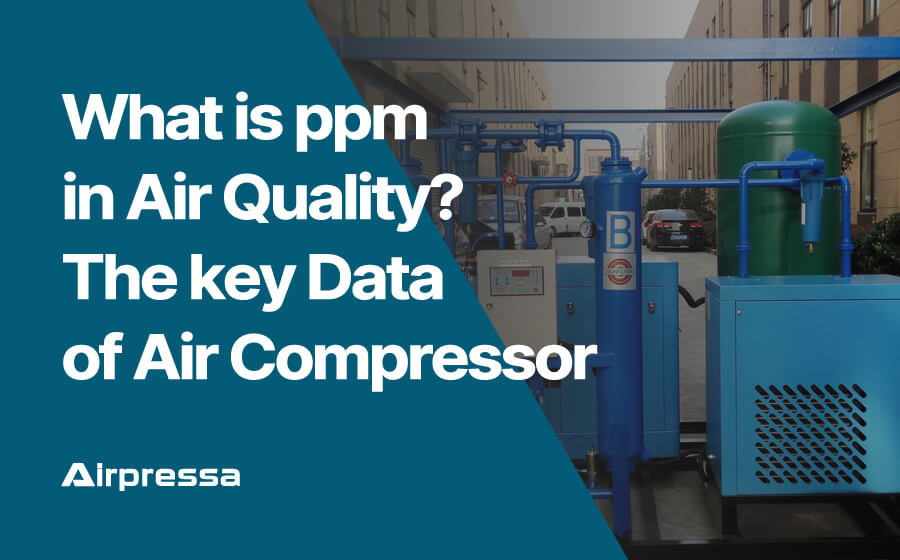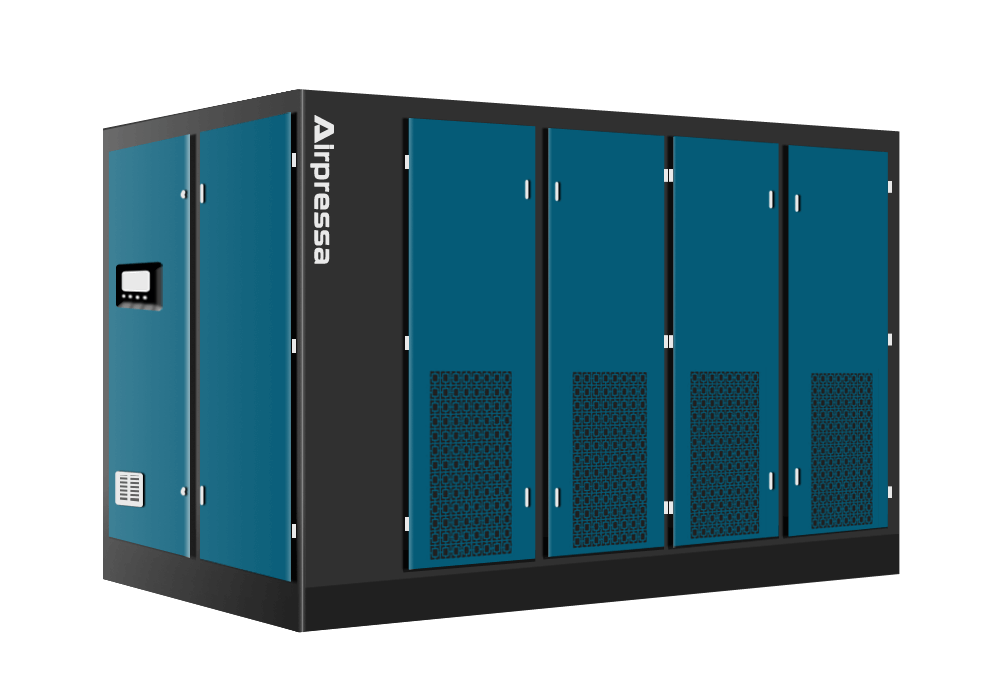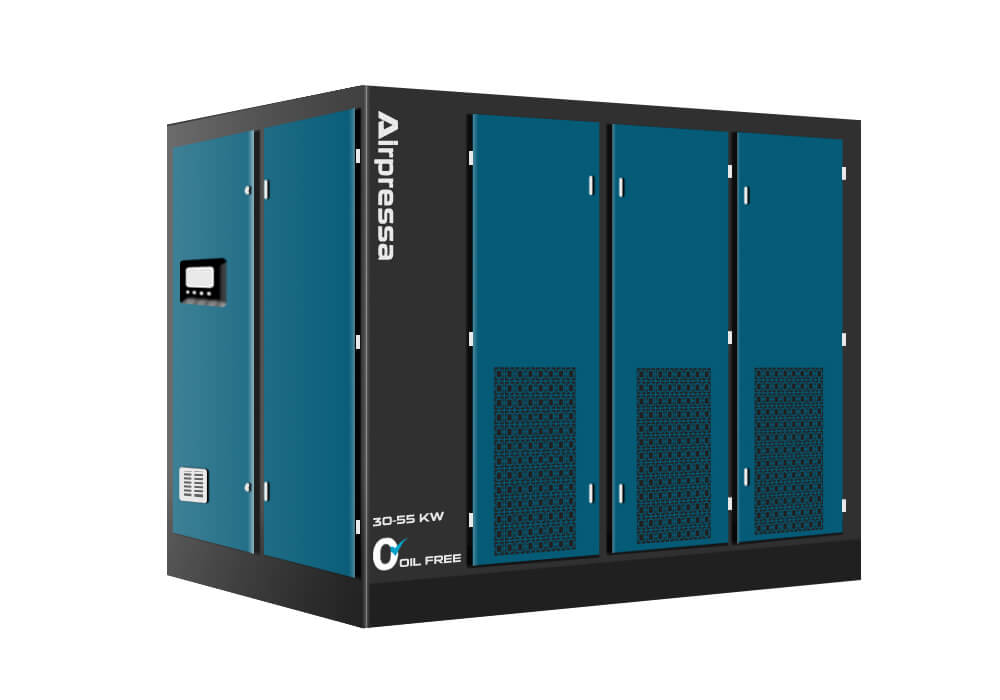
Understanding ppm in air quality enables industries to monitor and maintain optimal air purity levels, minimize contamination risks.
By selecting air compressors with appropriate specifications and monitoring ppm levels effectively could ensure the application safety and efficiency of compressed air systems.
You can click on any section that you interest to get there quickly.
What is ppm in Air Quality?
Parts per million (ppm) is a unit of measurement used to express the concentration of a substance in a gas or liquid. In the context of air quality, ppm refers to the number of molecules of a particular substance present in one million molecules of air.
It is commonly used to quantify the concentration of contaminants or pollutants in the air, including gases such as oil content, carbon dioxide (CO2), carbon monoxide (CO), nitrogen oxides (NOx), sulfur dioxide (SO2), and volatile organic compounds (VOCs).
Key Data of Air Quality in Air Compressor
If you are purchasing a compressor, it’s important to consider not only factors such as air output (FDA), power (kw/hp), and efficiency, but also the quality of the compressed air, which is a key factor that should not be overlooked.
Oil Carryover Rate
The oil carryover rate of an air compressor indicates the amount of lubricating oil that is entrained in the compressed air stream. It is measured in ppm and represents the concentration of oil particles present in the compressed air.
Lower oil content are desirable, especially in applications where oil contamination can adversely affect product quality or downstream equipment.
Air Purity Class
Air compressors are often classified based on their ability to deliver compressed air with specific purity levels. This classification is defined by standards such as ISO 8573, which specifies the maximum allowable concentrations of contaminants, including particles, water vapor, and oil.
For example, Class 0 represents the highest level of air purity, with oil content limited to less than 0.01 ppm.
The Ultimate Guide: What Is The Oil-free Air Compressor?
The oil-free air compressor is one of the most popular types of air compressors. It plays a vital role in many industries and manufacturers.
In this guide, we will delve into the world of oil-free air compressors and explore their benefits, applications, and maintenance requirements. So, let’s dive in and discover what makes oil-free air compressors a top choice for many industries.
Volatile Organic Compounds (VOCs)
VOCs are organic chemicals that can evaporate into the air and contribute to air pollution.
Air compressors equipped with appropriate air filter systems can help reduce VOC emissions to levels below regulatory limits, typically measured in ppm.
Dew Point Temperature
The dew point temperature is crucial for both air compressors and their applications.
The dew point temperature indicates the temperature at which air becomes saturated with moisture and starts to condense into liquid water.
Maintaining a low dew point temperature could prevent moisture-related issues such as corrosion, contamination, and pneumatic system malfunctions.
Dew point measurements are expressed in degrees Celsius or Fahrenheit and provide valuable insight into air quality and moisture content.
What Is Pressure Dew Point? Why Is It So Important?
Pressure dew point is a key term that must be mentioned in the air compressor industry. It plays a vital role in the entire compressed air system, connected equipment and applications.
Different from atmospheric dew point, pressure dew point has more practical application significance. So, what is pressure dew point and why is it so important?
How Many ppm Air Compressor Should I Choose?
When selecting an air compressor, you should understand its ppm level for your specific application.
Industry Standards and Regulations
Different industries may have specific air quality requirements mandated by regulatory agencies or industry standards organizations.
For example, the food and beverage industry often requires compressed air with very low oil content, typically below 0.01 ppm, to prevent contamination of products.
Application Requirements
Consider the intended use of compressed air in your application.
General manufacturing processes may tolerate slightly higher levels of contaminants, depending on the specific application. A high-quality oil-lubricated air compressor (≤3ppm) will suffice.
On the other hand, if your process involves sensitive equipment or products that are susceptible to contamination, such as medical devices or electronic components, you may need an air compressor with extremely low oil carryover rates, typically in the range of 0.001 ppm to 0.01 ppm.
At this time, an oil-free compressor is obviously more suitable for your needs.
Environmental Factors
Environmental conditions, such as temperature, humidity, and airborne particulate matter, can affect air quality requirements.
In environments with high levels of airborne pollutants or where compressed air comes into contact with sensitive materials, such as food or pharmaceutical products, a lower ppm level may be necessary to maintain product integrity and ensure safety.
Compressor Technology and Filtration Systems
Different types of air compressors, such as oil-injected rotary screw compressors, and reciprocating compressors, have varying levels of oil carryover and air purity.
Additionally, the quality and efficiency of filtration systems installed in the compressor can significantly impact the ppm level of compressed air. Choose a compressor with appropriate technology and filtration capabilities based on your ppm requirements.
If the application environment is harsh, Airpressa strongly recommends the use of air dryers and air filter systems. Sometimes, pre-air filters are also equipped.
Airpreesa provides variety series of screw air compressors, including oil-lubricated & oil-free air compressors, fixed speed & variable speed air compressors, low pressure & high pressure air compressors, diesel compressors, etc.
Applicable to more than 80% of industries and projects.

Oil Lubricated Air Compressors
The most widely used compressor.
It is suitable for harsh working conditions, has high balance precision, and runs smoothly at high speed.

Oil Free Air Compressors
APS-OF series are used in industry and manufacturing industry in more than 100 countries as oil-free air compressors.
APS-VS-WOF variable speed water oil free air compressor 250kw is our flagship product, is suitable for many heavy industrial air compression systems.